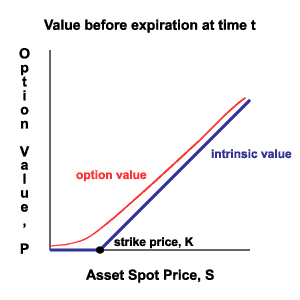Market stock price versus intrinsic value
There is a significant difference between intrinsic value and market value.
Intrinsic value is an estimate of the actual true value of a company. Market value is the value of a company as reflected by the company's stock price. Therefore, market value may be significantly higher or lower than the intrinsic value. There is an inherent degree of difficulty in arriving at a company's intrinsic value. Due to all the possible variables involved, such as the value of the company's intangible assets , estimates of the genuine value of a company can vary greatly between analysts.
What is the difference between intrinsic value and current market value? | Investopedia
Some analysts utilize discounted cash flow analysis to include future earnings in the calculation, while others look purely at the current liquidation value or book value as shown on the company's most recent balance sheet.
Further difficulty arises from the fact that the balance sheet itself, since it is an internally produced company document, may not be a completely accurate representation of assets and liabilities. Market value is the company's value calculated from its current stock price and rarely reflects the actual current value of a company.

The reason for this is that the market value reflects supply and demand in the investing market, how eager or not investors are to participate in the company's future. The market value is usually higher than the intrinsic value if there is strong investment demand, leading to possible overvaluation.
The opposite is true if there is weak investment demand, which can result in undervaluation of the company. Dictionary Term Of The Day.
A measure of what it costs an investment company to operate a mutual fund. Latest Videos PeerStreet Offers New Way to Bet on Housing New to Buying Bitcoin? This Mistake Could Cost You Guides Stock Basics Economics Basics Options Basics Exam Prep Series 7 Exam CFA Level 1 Series 65 Exam. Sophisticated content for financial advisors around investment strategies, industry trends, and advisor education.
What is the difference between intrinsic value and current market value? Maverick January 12, — 9: Take a deeper look at why value investors consider a stock's intrinsic value an important consideration before picking a Discover how the intrinsic value and market price of a stock are related and why a stock that appears overvalued may still Book value and intrinsic value are two ways to measure the value of a company. In simple terms, book value is based on the Understand why the concept of intrinsic value is important for options traders and how they can use it to estimate what a See why the concept of intrinsic value is so important in options trading and how investors use it to evaluate the worth Intrinsic value can be subjective and difficult to estimate.
Discover how investors can use this valuation method to determine the intrinsic value of a stock. Learn more about this way of valuing a company or an asset based on an underlying perception of its true value. Find out whether investors and analysts believe that Texas Instruments would make a good value play at its current valuation, and learn more about its outlook.
Warren Buffett has long been hailed as a value investor. But is that statement still accurate? Find out how to identify mispriced stocks. Learn about intrinsic and relative valuation methods based on fundamentals, and technical analysis. Value investing has its advantages, but it also has significant drawbacks. We look at the pros and cons.
Calculating Intrinsic Value With the Dividend Growth Model
Take advantage of stock movements by getting to know these derivatives. The portion of an option's premium that is attributable to the A method of determining an asset's value that takes into account The process of determining the current worth of an asset or company.
An expense ratio is determined through an annual A hybrid of debt and equity financing that is typically used to finance the expansion of existing companies. A period of time in which all factors of production and costs are variable.
In the long run, firms are able to adjust all A legal agreement created by the courts between two parties who did not have a previous obligation to each other. A macroeconomic theory to explain the cause-and-effect relationship between rising wages and rising prices, or inflation. A statistical technique used to measure and quantify the level of financial risk within a firm or investment portfolio over Content Library Articles Terms Videos Guides Slideshows FAQs Calculators Chart Advisor Stock Analysis Stock Simulator FXtrader Exam Prep Quizzer Net Worth Calculator.
Work With Investopedia About Us Advertise With Us Write For Us Contact Us Careers. Get Free Newsletters Newsletters. All Rights Reserved Terms Of Use Privacy Policy.